Inside Cancer
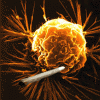
Addicted cancers
Jun 9th
Most people know that smoking is a hard habit to kick because smokers become addicted to the nicotine and habit. Equally sad is the tendency of young adolescents to start smoking for social and psychological reasons.
In a turn-around of sorts, it may be comforting to know that cancers can become addicted, too. Cancer cells have many different genetic changes, as well as changes in the expression of genes that are not due to mutations called epigenetic changes. Although cancer cells do have many differences from normal cells, they are still very similar to normal cells, making it very difficult to More >
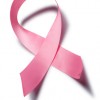
Breast Cancer Screening: Age or Density?
Apr 29th
Next to skin cancer, the most prevalent form of cancer in women is breast cancer. According to the American Cancer Society (ACS) the chance of developing breast cancer over a lifetime is less than 1 in 8. The most extensively used breast screening technique is an x-ray exam of the breast or mammogram. The ACS reports that organized mammographic screening reduces breast cancer mortality by more than 60%, and recommends yearly mammograms starting at age 40. Women with a strong family history of breast cancer, or who have other risk factors, are advised to begin routine screening earlier.
However, there’s no shortage More >
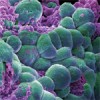
Common Cancers
Mar 9th
I was just looking at a list of common cancers and the estimated number of deaths due to these cancers. I knew about the importance of many of them. For instance, breast, lung, prostate and rectal or colon cancers are all very common. However, I didn’t know much about the relative rates of any of these cancers, or the numbers of people that die from them.
Here are just some of the things that surprised me. First, skin cancers are really common, even compared to what I thought: over 1 million new cases are diagnosed a year in the United States. More >
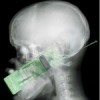
Cell Phones: Where’s my earpiece?
Jan 29th
Cell phone usage has increased dramatically in recent years, with the number of subscribers exceeding 3 billion subscribers worldwide. Numerous case-control studies have examined the possible correlation between long term use of cell phones (specifically, the electromagnetic radiation emitted by cell phones) and the incidence of brain tumors.
In the fall of 2009, the World Health Organization published a 10 year study which examined the cell phone habits of more than 120,000 people in 13 countries. The study reported a significantly higher risk of developing brain tumors in individuals with 10 years or more of cell phone usage. Similar findings in More >

Cancer-free mole rats may hold a key to fighting cancer.
Jan 11th
I was always under the impression that sharks never got cancer. It turns out that isn’t true – they do get cancer, but less often than people. There is an animal that doesn’t get cancer though, and that is the naked mole rat. These cute little creatures live long lives underground, so I’m not sure how anyone figured this out.
Needless to say, an animal that doesn’t get cancer is something worth studying. Why no cancer? It turns out that mole rat cells don’t “like” each other very much. Researchers discovered that when these cells are cultured, they stop dividing at More >

Six Tips on Avoiding Cancer
Nov 30th
Most of us know that smoking cigarettes and excess exposure to the sun can increase the risk of getting cancer. In fact, much of cancer can be avoided by changing behavior. For examples of some causes of cancer, check out Inside Cancer. Some of the causes of cancer are less obvious. An example is maintaining a healthy weight. Did you know that overweight people are 50% more likely to die of cancer than those with normal body weight? In the United States, this means each year about 90,000 people die of cancer that could be prevented if we could all More >
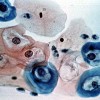
HPV twist?
Nov 17th
Human Papilloma Virus (HPV) is a family of small, non-enveloped DNA viruses which infect epithelial cells, and of which there are over 100 subtypes. HPV is divided into two major categories, high risk types which includes types 16, 18, 31. 33, 35. 39, 45, and low risk types 6 and 11. HPV 16 is implicated in over 90% of cervical cancers and shown to be a causal factor in the development of the disease. HPV produces two oncoproteins, E6 and E7, which inactivate the cellular tumor suppressor proteins, p53 and pRB respectively. This allows it to disable two of the More >

Canines and cancer
Oct 21st
For my blog, I thought I would talk a bit about dogs and cancer. Why, you might ask? I’m not a dog owner, but recently a few stories about dogs and cancer were brought to my attention and I thought they might be interesting to others.
You may not know this, but dogs can actually smell some cancers. It doesn’t even take a sophisticated sniffer dog to do this: even some household dogs can be trained to tell the difference between the odor of a normal person and that of a person with lung cancer. In theory, your dog Max could More >

Hildegard’s Dilemma
Oct 14th
Hildegard von Bingen, a 12th century nun was celebrated for her intellect, writings, and notably for her extraordinary visions – also known as migraine auras. Ask any migraineur about the scintillating scotomas preceding a migraine, and you’re likely to receive a flinching look in return. Migraines with aura are chronic headaches characterized by specific neurological symptoms – visual disturbances, nausea, sensitivity to light, sounds, smells, and usually accompanied with an unilateral blinding headache—the hallmark TKO of migraines. Now it appears that female migraineurs might find an unexpected silver lining in the migraine cloud – researchers at the Fred Hutchinson Cancer More >

Coffee and cancer – good or bad?
Aug 31st
Welcome to my first post to the Inside Cancer Blog… I hope you enjoy.
I’m a bit of a coffee drinker, so I often wonder if this is good or bad. Growing up, it was always presented as a vice. Yet, I have been drinking coffee all my life- and coffee has thousands of chemicals in it. Should I try to quit, or am I all right? Given all the chemicals, I have worried that I might be exposing myself to a cancer causing chemical- a carcinogen. Recently, a few reports have looked into this. On the whole, coffee comes out More >
